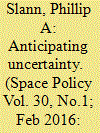| Srl | Item |
| 1 |
ID:
147515


|
|
|
|
|
| Summary/Abstract |
Terrestrial societies are heavily dependent on Earth-orbiting satellites for the provision of services which many people now take for granted. However, with this dependence comes a need to preserve the transmission of these services whilst faced with a number of risks and dangers, including intentional interference, space debris and radiation emanating from space weather phenomena. The European Union (EU) has identified these services, along with the satellites and networks which provide them to its citizens, as critical infrastructures, indicating the need for their security. The article frames the EU's efforts to secure its critical outer space infrastructures, namely the draft International Code of Conduct for Outer Space Activities and the Space Situational Awareness programme, through the lens of anticipatory security. The article concludes that both these approaches to outer space security are predicated upon the precautionary acknowledgement of risks or threats and involve mostly preemptive measures alongside some elements of prevention.
|
|
|
|
|
|
|
|
|
|
|
|
|
|
|
|
| 2 |
ID:
132566


|
|
|
|
|
| Publication |
2014.
|
| Summary/Abstract |
This report summarises the presentations which took place at the 'Space Traffic Control - Is the Space Debris Problem Solvable?' conference hosted by the Royal Aeronautical Society on the 2nd July 2013. The conference sought to promote discussion over methods to deal with the issue of space debris in particular and speakers included representatives from the European Space Agency, the United Kingdom Space Agency, practitioners and academia. Themes which emerged during the conference included the urgency of the problem of space debris, the need for short-term and long-term solutions, the necessity for the development and implementation of space debris remediation technologies to complement existing mitigation efforts and, last but not least, the wider applications of space traffic control. Regarding the sub-title of the conference, 'is the space debris problem solvable?', it would appear from the presentations that while there is the potential for future management of the issue through debris remediation and harmonised mitigation efforts, no comprehensive solutions exist at the time of writing.
|
|
|
|
|
|
|
|
|
|
|
|
|
|
|
|